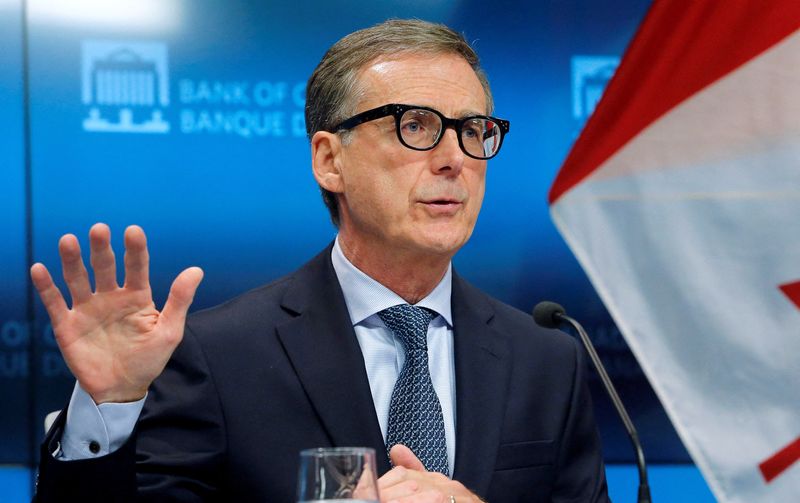By Steve Scherer and David Ljunggren
OTTAWA (Reuters) -Canada's red-hot labor market can weather an economic slump without seeing a major surge in unemployment, Bank of Canada Governor Tiff Macklem said on Thursday, ahead of another expected interest rate increase in December.
Inflation has eased to 6.9% from a peak of 8.1%, but it is still far above the central bank's 2% target and underlying price pressures remain broad-based. The central bank forecasts growth will stall through the middle of next year.
"That's not a severe recession, but it is a significant slowing of the economy," Macklem said in a speech to students and researchers in Toronto. Tightening monetary policy to combat inflation would push up the jobless rate, he added.
"But because the labor market is so hot and we have an exceptionally high number of vacant jobs, there is scope to cool the labor market without causing the kind of large surge in unemployment that we have typically experienced in recessions," he said.
When pressed by reporters at a news conference, Macklem said that during recessions since the 1980s, unemployment has risen between 3 to 6 percentage points. In this downturn, "we're talking about something considerably less than that," he said.
Since hitting a record low of 4.9% in June, the unemployment rate has crept up and was 5.2% in October, but the labor market remains "unsustainably tight," Macklem said.
"We've seen initial signs that these exceptionally tight labor market conditions have started to ease," he said. "Wage growth has risen but now looks to be plateauing."
When the federal government announced billions in new spending in its fiscal update last week, Finance Minister Chrystia Freeland said she was not making the central bank's job harder. When asked, Macklem appeared to agree.
"The budgetary forecasts, spending decisions embedded in the fall economic statement would not be ... of macro economic significance" with respect to the growth and inflation forecasts it made in October, Macklem said.
The Bank of Canada has lifted its benchmark rate by 350 basis points since March to 3.75%, one of its fastest tightening cycles ever, and Macklem has not ruled out another oversized rate hike at the next meeting on Dec. 7.
When asked on Thursday whether he was leaning toward a 50- or a 25bps rate hike in December, Macklem said: "We'll see."

In the future, more immigration, better training and expanding the workforce through digitalization and flexibility can help boost labor supply, which would allow more sustainable growth with less inflationary pressure, Macklem said.
The Canadian dollar was trading 1.2% higher at 1.3360 per U.S. dollar, or 74.85 U.S. cents, as the greenback tumbled against a basket of major currencies.